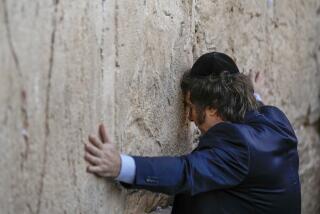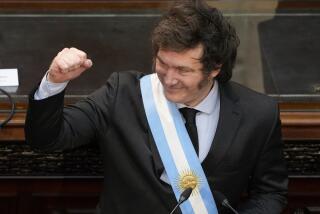Argentine President Passes the Test
- Share via
BUENOS AIRES — A few years ago, Carlos Menem, then president of Argentina, was famous for embracing all things American. One of his ministers said Argentina would be so closely allied to the United States they would have a “carnal” relationship.
Nestor Kirchner, the current president, is more of a fighter than a lover. A week before his meeting with President Bush on Tuesday, in response to a question from the media here, Kirchner said if the two men boxed he would beat Bush “by a knockout.”
Bush’s meeting with Kirchner was just one of half a dozen the U.S. president had with other leaders during the two-day Summit of the Americas in Monterrey, Mexico, which concluded Tuesday. Bush also met with the leaders of Mexico, Canada, Brazil, Chile and Bolivia.
But in Argentina, a heavily indebted country of 38 million people that remains dependent on the patience of the international financial community, the tete-a-tete between the two presidents was a closely watched event.
“Bulletin! Bush-Kirchner meeting completed!” flashed a graphic on the Cronica television network here.
On rival network TN, a newswoman enthusiastically reported that “the meeting appears to have lasted much longer than the 15 minutes originally planned for it.”
By all accounts, the two presidents did not don boxing gloves during their 45-minute meeting. Still, in the days leading up to the event, the Argentine media painted the appointment as a test of courage for Kirchner, a gangly former governor from the steppes of Patagonia.
“My impression of him is that he’s not afraid of anybody,” said Walter Castillo, the owner of a small clothing factory. “I think he’s fighting to improve Argentina’s image. In the little time he’s been in office, he’s done things well.”
The fact that most Argentines now see Kirchner as their warrior is no small feat for a man whose image before taking office was that of an ill-at-ease provincial leader. Moments after his May 2003 inauguration, he bumped his head -- and spent his first day in office bandaged. Since then, Kirchner’s government has presided over a mild economic recovery. He has also defied American foreign policy with a series of small acts of independence -- or petulance, depending on your point of view -- little noticed in the U.S. media but widely reported here.
In October, a U.S. military exercise with Argentine and Brazilian troops here -- Operation Eagle Three -- was canceled when Kirchner and the Argentine government refused to grant the U.S. troops immunity from any human rights charges that might be leveled against them.
And on Monday, Argentine diplomats said Kirchner had defied a U.S. “suggestion” that he not meet during the summit with President Hugo Chavez of Venezuela, whose open support of Fidel Castro has made him a bete noire of the Bush administration.
Argentine diplomats told the daily newspaper La Nacion that Kirchner would meet with Chavez “as a sign that the government has not strayed from its opposition to an automatic alliance with Washington.”
In another meeting Monday, with International Monetary Fund Managing Director Horst Kohler, Kirchner held firm on the question of Argentina’s private debt. Recently, Kirchner offered to pay investors who hold about $90 billion in defaulted Argentine government bonds a fraction of the bonds’ nominal worth. The IMF wants Argentina to pay more.
“They can pressure me all they want, but I will not change my position,” Kirchner said after the meeting. He pointed out that those who invested in the bonds were at one point earning interest rates of as much as 30% annually. “Those who gambled with these high-risk bonds knew that they were playing in a casino.”
The status of Argentina’s debt was one of the agreed-upon topics of Bush’s meeting with Kirchner. It’s a sensitive subject for the people of Argentina, who feel they have been made to pay for the wastefulness of their leaders.
The last popularly elected president before Kirchner, Fernando de la Rua, was run out of office in 2001 after adopting an austerity plan -- cutting social security pensions and government jobs -- so that Argentina could balance its budget and keep paying its creditors.
Daniel Varela, a 17-year-old who runs a newspaper stand, said he hoped Kirchner would adopt a different strategy with the United States.
The Bush administration is widely seen here as a dark force that is trying to bend Argentina and other developing countries to its will.
“He needs to tell the United States to support us more, and not be so hard with us,” Varela said. “Just because things are going a little better now doesn’t mean we can pay more.”
More to Read
Sign up for Essential California
The most important California stories and recommendations in your inbox every morning.
You may occasionally receive promotional content from the Los Angeles Times.











